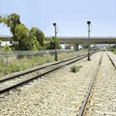
Israel sets big rail plans, dreams of regional hub
Premise of new plan to expand Israel's rail network is future peace, says Transportation Ministry official. Netanyahu plans on investing NIS 30 billion in development of road, rail infrastructure to push business, people outward from Tel Aviv conurbation
Rusty rails run off into scrub. It is a bridge to nowhere.
The war of 1948 that partitioned Palestine also severed a once busy line linking the heartland of the Arabian peninsula to the port of Haifa on the Mediterranean. Now, ambitious plans to expand Israel's rail network raise an intriguing dream of one day reviving what were once the arteries of Middle East trade.
"The premise behind the plan is future peace," says Yitzhak Suchman, who oversees planning for $7 billion of new projects at Israel's Transport Ministry. "A train from Beit Shean to Haifa is also designed for future cargo shipments from Jordan and even Iraq", he adds.
Another line "could be extended to Lebanon".
It is easy to see cracks in such dreams. They are wreathed in the coal-fired steam of an earlier era, when Ottoman sultans, with European imperialists and business adventurers, forged iron ways along the routes long trod by camel caravans.
The idea of restitching the Middle East, with Israel's Arab foes in Syria, Iraq or Saudia Arabia using its railways to speed cargo to the sea, or ferry tourists up the old coastal line from Cairo via Tel Aviv to Beirut, is far-fetched to say the least.
Israel's domestic plans are themselves, still embryonic.
Yet Prime Minister Benjamin Netanyahu, not a man well liked by his Arab neighbors, has put money where his mouth is.
"We're talking about some 30 billion shekels ($7.8 billion) over 10 to 15 years ... This is quite manageable," Netanyahu said in February of plans to use road and rail infrastructure to push business and people outward from the Tel Aviv conurbation.
Some critics say rail is a wasteful way to do that; renewing old transit links from the Gulf and Red Sea to the Mediterranean might, in the very long-term, make a better economic argument.
History, though, has harsh lessons for such pipe dreams.
A few miles up the line from the forlorn boxcars at Gesher - a kibbutz whose name means "Bridge" in Hebrew -- a steel span lies fallen into the Yarmouk valley. Minefields there still mark the border of Jordan with the Israeli-occupied Golan Heights.
Before Jewish guerrillas blew it up in 1946, it carried the Haifa line up gorges toward Damascus, joining the storied Hejaz Railway, which took pilgrims to Mecca. But Israel's isolation from the Arab world, heralded by the Yarmouk and other bridge bombings, goes on, barely shaken by peace with Jordan and Egypt.
Trade with neither amounts to much for Israel. Other plans for regional transport have foundered in the past decade or so.
From the sea to the Jordan
Yet in an interview in Tel Aviv, Suchman, the Transport Ministry director of planning, said of his newly granted budget: "The decision is first and foremost about trains.
"Two projects - the first is the Valley train project from Afula to Beit Shean with possible future link to Jordan," he said. That line, down the Jezreel Valley, once ran the 70 km (45 miles) from Haifa via Afula, near Nazareth, to Beit Shean by the Jordan. It then ran on to Gesher and into Jordan and Syria.
The second element would drive Israel's Mediterranean main line south across the Negev desert to the Red Sea port of Eilat.
Inspired by 19th-century railroad pioneers who opened up the American West, Netanyahu says Israelis must move out from the coast. He has also called on Arab leaders to make an "economic peace" that would restore the region as a hub of global trade.
Suchman said domestic priorities would lead to international possibilities. "The big idea is
most people who live in Israel can come to Tel Aviv in under two hours," he said. He envisaged an international tender to lay rail from Eilat, next to Aqaba in Jordan and Egypt's Taba, to the Mediterranean port of Ashdod.
That route was once part of a transcontinental supply chain linking India to Europe via dhow and camel from Yemen to Gaza.
Palestinian interest
More immediately affected by Israel's plans than Arab states around it, are the Palestinians.
Their reaction has been mixed.
A recent remark by Israel's transport minister on reviving a rail route from Jenin to Nablus and then to Jerusalem reminded them of long anger at Israeli road-building for Jewish settlers.
Suchman insisted current plans did not include Palestinian lands at all but did feature a station in Israel near Jenin that could serve Palestinian trade. "If there is peace," he added, "The railway could be extended from there into the West Bank."
Palestinian Prime Minister Salam Fayyad does want to a share in Israeli rail plans, particularly the line from Jordan to the sea. "We would like to see the rail line going through the Palestinian territories," government spokesman Ghassan al-Khatib said. "If this is a regional project, it should consider the interests of all the parties, including the Palestinians."
For now, the budgeted 27.5 billion shekels ($7.1 billion) is still spending mainly on blueprints, rather than building.
Suchman admits the planning stage alone may take years.
A 40-minute link from Tel Aviv to Jerusalem is way behind schedule. A light rail across Jerusalem, controversially built on occupied land, may finally open next year after much delay.
Suchman, though, like his prime minister is undaunted. "This is our biggest transportation plan ever - in terms of real money," the railway planner said. "I believe we will succeed."















